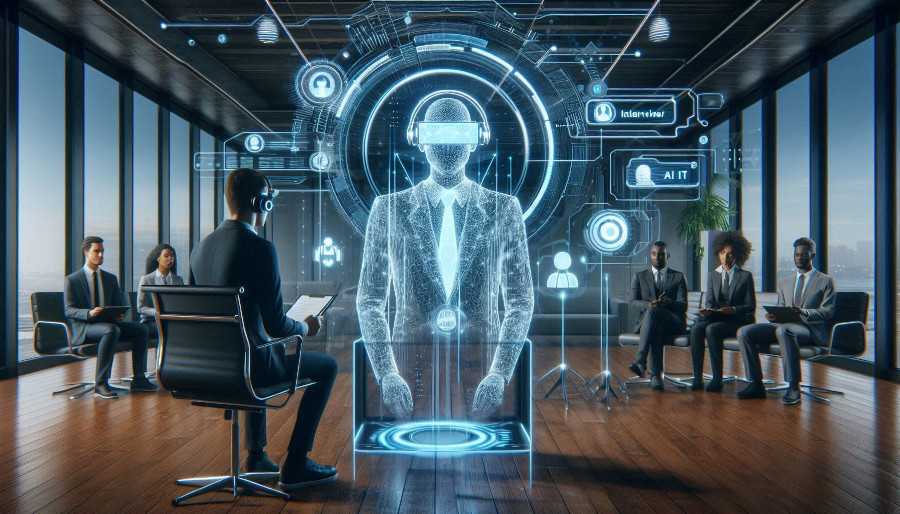Ethical Implications of AI in Recruitment: A Deep Dive
-
 Mark Dewan
Mark Dewan - 09 Apr, 2024

The Ethical Implications of Using AI in Recruitment: A Deep Dive
Artificial Intelligence (AI) has revolutionized the way we recruit and hire talent. From automated resume screening to AI-powered video interviews, these technologies offer numerous benefits, including increased efficiency and accuracy. However, the ethical implications of using AI in recruitment cannot be ignored. In this blog post, we’ll delve into the key ethical concerns and explore strategies to mitigate potential risks. For a look at the challenges from the job seeker’s perspective, read about overcoming the challenges of AI-powered job search tools.
Bias and Discrimination
One of the most significant ethical concerns surrounding AI in recruitment is the potential for bias and discrimination. AI algorithms are trained on data, and if that data is biased, the AI system will perpetuate those biases. For instance, if an AI system is trained on historical data that shows a preference for male candidates in certain roles, it may inadvertently discriminate against female candidates.
To mitigate bias, organizations must:
- Diverse and Inclusive Training Data: Ensure that the data used to train AI algorithms is diverse and representative of the population.
- Regular Audits: Conduct regular audits of AI systems to identify and address biases.
- Human Oversight: Human involvement is crucial to oversee AI decisions and mitigate bias.
Data Privacy and Security
AI-powered recruitment tools often collect and process personal data, raising concerns about data privacy and security. It’s essential to implement robust data protection measures to safeguard sensitive information.
Key considerations include:
- Transparent Data Practices: Be transparent about how data is collected, stored, and used.
- Secure Data Storage: Implement strong security measures to protect data from unauthorized access.
- Compliance with Data Protection Laws: Adhere to relevant data protection regulations, such as GDPR and CCPA.
Lack of Transparency and Explainability
AI algorithms can be complex and difficult to understand. This lack of transparency can lead to concerns about fairness and accountability. To address this issue, organizations should:
- Explainable AI: Develop AI models that can explain their decision-making processes.
- Human Oversight: Human decision-makers should be involved in the recruitment process to review AI-generated recommendations.
Job Displacement and Economic Inequality
As AI becomes more sophisticated, there is a risk of job displacement, particularly for roles that are easily automated. To mitigate this risk, organizations should:
- Reskilling and Upskilling: Invest in training and development programs to equip employees with the skills needed to thrive in the AI era.
- Ethical AI Implementation: Implement AI in a way that complements human capabilities rather than replacing them.
The Future of AI in Recruitment
Despite the challenges, the future of AI in recruitment is promising. By addressing ethical concerns and leveraging AI responsibly, organizations can improve their hiring processes and build more diverse and inclusive workforces.
Key trends to watch include:
- AI-Powered Talent Acquisition: AI can help identify and attract top talent from a global pool of candidates.
- AI-Driven Employee Experience: AI can be used to enhance the employee experience, from onboarding to performance management.
- Ethical AI Frameworks: The development of ethical frameworks for AI in recruitment can help ensure fairness and transparency.
By embracing AI in a responsible and ethical manner, organizations can unlock its full potential and build a brighter future of work. To see how AI is changing the landscape, read about the future of AI in recruitment.
Additional Tips for Ethical AI in Recruitment:
- Regularly Review and Update AI Algorithms: Ensure that AI algorithms are regularly updated to reflect changes in the job market and societal norms.
- Involve Diverse Teams in AI Development: Diverse teams can help identify and mitigate biases in AI systems.
- Prioritize Human Connection: While AI can automate certain tasks, human interaction remains crucial for building relationships and understanding candidates’ motivations.
- Be Transparent About AI Usage: Communicate openly with candidates about the role of AI in the recruitment process.
- Stay Informed About AI Regulations: Keep up-to-date with the latest regulations and guidelines related to AI and recruitment.
By following these guidelines, organizations can harness the power of AI to improve their recruitment processes while upholding ethical principles.


